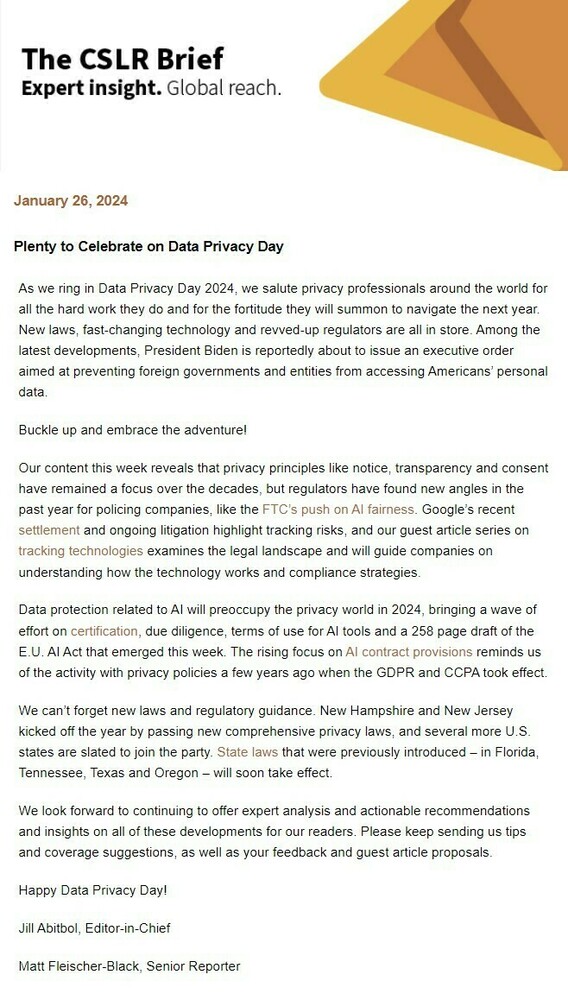Apr. 17, 2024
Apr. 17, 2024
Tracking Technologies: Compliance Challenges and Solutions
The ecosystem and dynamic state of digital technologies, and the legal regimes around them, present companies with complexities that require thoughtful compliance and risk-mitigation strategies. In this final installment of a four-part guest article series, seasoned privacy attorneys Michael Hahn of IAB, Leslie Shanklin of Proskauer and Julie Rubash of Sourcepoint examine some of those compliance challenges and solutions specific to the digital advertising industry, as well as broader tracker use litigation risks and mitigation steps. Part one kicked off the series with a review of the legal landscape around digital tracking. Part two took a deep dive into the technical workings and types of digital data collection tools. Part three provided a roadmap for organizations working toward crafting a comprehensive, cross-functional program for managing digital trackers. See “Benchmarking the Impact of State Privacy Laws on Digital Advertising” (Oct. 11, 2023). Read full article …
AI Governance Strategies for Privacy Pros
Privacy and compliance teams have become the front line at many organizations for ensuring the right safeguards are in place as new generative AI tools are being purchased and used by the business. This article, distilling insights offered during an International Association of Privacy Professionals Global Privacy Summit 2024 panel, offers practical tips for approaching AI governance. It addresses the legal landscape, strategies for building the program and addressing common issues, and the technical side of AI governance as discussed by privacy professionals from Ancestry, INQ Consulting, Frankfurt Kurnit and Transcend. See our two-part series on the practicalities of responsible AI: “AI Governance Gets Real: Tips From a Chat Platform on Building a Program” (Feb. 1, 2023), and “AI Governance Gets Real: Core Compliance Strategies” (Feb. 8, 2023). Read full article …
How to Achieve Privacy by Design With a Technical Privacy Review
The GDPR and other laws require privacy by design, but it remains a broad imperative without firm standards. Companies aiming to comply now often conduct a technical privacy review (TPR) as a step before a better-known exercise, the privacy impact assessment. At the recent International Association of Privacy Professionals Global Privacy Summit, prominent privacy engineers from DoorDash, Meta, Microsoft and Uber performed a simulated TPR that examined a consumer app’s reliance on a large language model. This article distills the simulation’s interview dialogue and resulting action items, as well as the speakers’ advice for conducting TPRs. See “Effective Use of Privacy Impact Assessments” (May 4, 2022). Read full article …
Venable Expands Cybersecurity Practice in San Francisco and Washington, D.C.
Venable has broadened its national security, international policy and IT expertise with two new additions. Davis Hake has joined as senior director of cybersecurity services in San Francisco, and Adam Dobell will serve as director of global security and technology strategy in Washington, D.C. For insights from Venable, see our two-part series on legal and ethical issues in the use of biometrics: “Modality Selection, Implementation and State Laws” (Feb. 21, 2024), and “FIDO, Identity-Proofing and Other Options” (Feb. 28, 2024). Read full article …
Tech and Data Partner Rejoins Moses Singer
Moses & Singer has announced the return of Liberty McAteer as a partner in its intellectual property and AI & data law groups in New York. McAteer rejoins the firm from FreeWire Technologies, Inc. For insights from Moses & Singer, see “Making Sense of Evolving Regulations, Recent Enforcement Efforts and Antitrust Claims as to ESG Investing in the U.S. and E.U. (Part One of Two)” (May 10, 2023). Read full article …
Most-Read Articles
-
Apr. 3, 2024
Examining Utah’s Pioneering State AI Law -
Apr. 10, 2024
Practical Insights Direct From U.S. State Privacy Enforcers -
Mar. 13, 2024
Connecticut AG’s Report Highlights Enforcement Risks and Points to Action Steps for Companies -
Jan. 17, 2024
Tracking Technologies: Privacy Regulation, Enforcement and Risk -
Mar. 20, 2024
Court Hands FTC Grounds to Curb Data Broker Sales
Spotlight on Trailblazing Women
To mark International Women’s Day 2024, women editors and reporters of ION Analytics interviewed outstanding women in the industries and jurisdictions we cover. In this part, Jill Abitbol, Managing Editor of the Cybersecurity Law Report and Anti-Corruption Report, features notable women in data privacy, cybersecurity, white collar defense, compliance and anti-corruption law, including Christina Montgomery, Leslie Shanklin, Palmina Fava, Alexandra Ross and Lucinda Low. Enjoy reading their inspiring remarks here.


